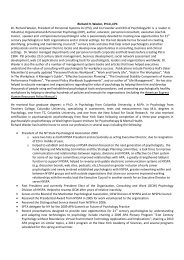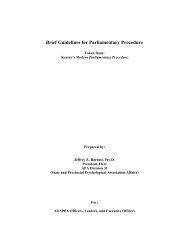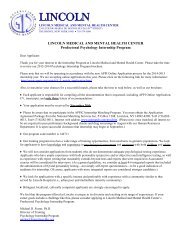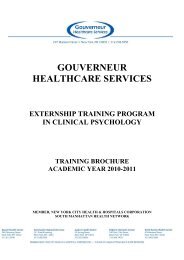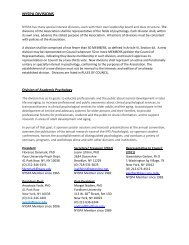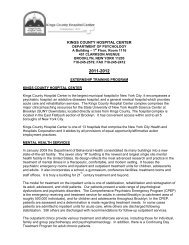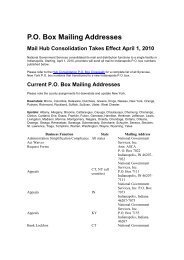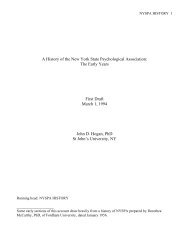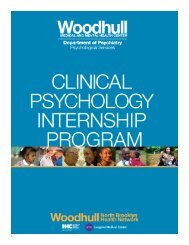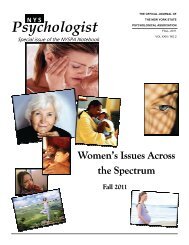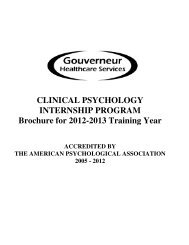NOTEBOOK - New York State Psychological Association
NOTEBOOK - New York State Psychological Association
NOTEBOOK - New York State Psychological Association
Create successful ePaper yourself
Turn your PDF publications into a flip-book with our unique Google optimized e-Paper software.
www.NYSPA.org<br />
APA Council Rep<br />
George Northrup, PhD<br />
NYSPA Member Since 1988<br />
Dianne Polowczyk, PhD<br />
NYSPA Member Since 1993<br />
<strong>New</strong> <strong>York</strong> is represented by two<br />
representatives to the APA Council of<br />
Representatives. These representatives<br />
meet two times a year to decide on<br />
policy for APA. This report is from the<br />
meeting held in conjunction with the<br />
APA Annual Convention, held in August<br />
in Orlando, FL this year.<br />
Wednesday began early with Caucus<br />
meetings starting at 7:00 am, an eighthour<br />
Council meeting, and then more<br />
caucus meetings. Besides being a<br />
mountain range in Asia, the Caucuses<br />
are various interest groups seeking to<br />
influence APA decision making. This<br />
day was the <strong>Association</strong> of Practicing<br />
Psychologists, which has begun a<br />
concerted effort to address the shortage<br />
of internship positions. We were<br />
impressed with its agenda, which also<br />
includes media campaigns on behalf<br />
of psychologists in private practice.<br />
Back to the Council meeting. Two<br />
very significant motions were<br />
approved. One was a resolution on<br />
the effectiveness of psychotherapy,<br />
which was overwhelmingly affirmed<br />
(153 Yes, 2 No, 1 Abstain). This<br />
resolution has been several years in<br />
the works, vetted and re-vetted obsessively.<br />
Though the acknowledgement<br />
by APA of psychotherapy’s value is<br />
absurdly overdue (say, 50 years or so),<br />
it is nonetheless a historic moment<br />
reflecting, we think, a shift in the right<br />
direction and away from the “better<br />
find another niche in which to<br />
practice” mentality.<br />
The second resolution was the<br />
Internship Stimulus Package, a threeyear,<br />
$3 million effort intended not to<br />
help create new internship positions<br />
per se, but perhaps several hundred<br />
newly accredited internship slots.<br />
Gaining accreditation by APA is<br />
expensive for programs sponsoring<br />
interns, and this package addresses<br />
that problem while also helping to<br />
build some momentum for practice<br />
issues. We both supported the package,<br />
George addressed the Council<br />
pointing out that much more needs to<br />
be done on behalf of newly minted<br />
psychologists burdened with historic<br />
levels of educational debt and facing<br />
1980s’ level managed care reimbursements<br />
as well as declining Medicare<br />
rates.<br />
Much of the afternoon on Wednesday<br />
was taken up with the Good Governance<br />
Project, an ambitious attempt to<br />
reform APA governance by making it<br />
more nimble and better able to prioritize<br />
its work. Council broke into<br />
small groups to discuss various reform<br />
scenarios (essentially incremental,<br />
moderate, and drastic), with an emerging<br />
consensus somewhere between<br />
moderate and drastic. Council members<br />
were clearly excited about the<br />
possibility of making meaningful<br />
changes that would allow the<br />
<strong>Association</strong> to focus more on “big<br />
ideas” and less on rubber stamping<br />
routine administrative issues.<br />
Budget and Finance. APA expects<br />
to spend about $116 million this year,<br />
with a $400 thousand budget surplus.<br />
It uses less than half of its real estate<br />
income of $8.6 million for operating<br />
expenses, with the bulk of this income<br />
going into the long term stock and<br />
bond investment portfolio, now worth<br />
about $67 million. Revenue is<br />
expected to grow next year, with<br />
another surplus likely.<br />
Public Education. APA is poised to<br />
publicize passage of the resolution on<br />
the effectiveness of psychotherapy<br />
with a press release next week and a<br />
five week campaign just before and<br />
during October, which is Depression<br />
Awareness month. Another initiative<br />
(“Psychology: Science in Action”)<br />
will promote our image as a hard<br />
science, trying to update the public’s<br />
impression that psychology is mainly<br />
a health service profession. APA<br />
pledges not to de-emphasize practice<br />
issues even as it raises the profile on<br />
scientific research.<br />
At Friday’s meeting, Council was<br />
briefed on the development of the<br />
World Health Organization’s ICD-11.<br />
Psychologists have been playing a<br />
major role in this revision, with active<br />
support by APA. One source indicated<br />
ICD-11 will displace DSM-V in<br />
2014. Presidential citations were<br />
awarded to two psychologists spearheading<br />
the effort.<br />
Council voted overwhelmingly to<br />
recommend changing APA bylaws to<br />
offer Council seats and voting<br />
privileges to the four ethnic minority<br />
psychological associations (Asian-<br />
American, Black, Indian [Native<br />
American], and Latina/o). Twice previously,<br />
the vote by APA membership<br />
has narrowly fallen short of the 2/3<br />
majority required to adopt this bylaws<br />
change. The problem may be with the<br />
“Pro” and “Con” statements that<br />
ordinarily must accompany a bylaws<br />
revision; these apparently suggest to<br />
the voting membership that an issue is<br />
hotly contested when that may not be<br />
the case at all.<br />
Once upon a time, Council attempted<br />
to amend the bylaws to delete the<br />
“Pro” ”Con” requirement. This change<br />
also had a “Pro” and “Con” statement<br />
attached to it and was, predictably,<br />
also defeated by the membership.<br />
Council received a lengthy Report on<br />
Educational Disparities from a Task<br />
Force that had been created by former<br />
APA President Melba Vasquez.<br />
19



